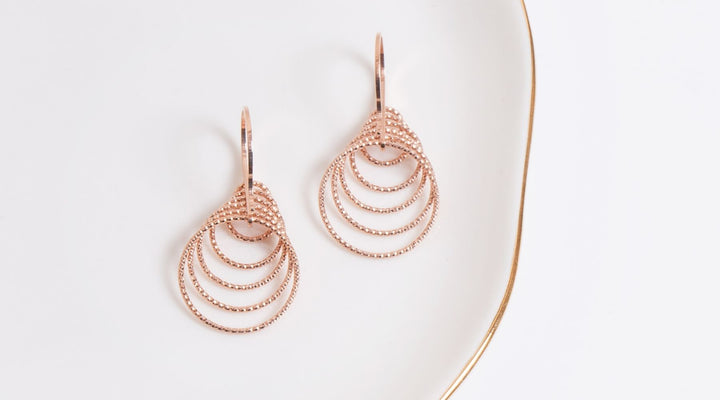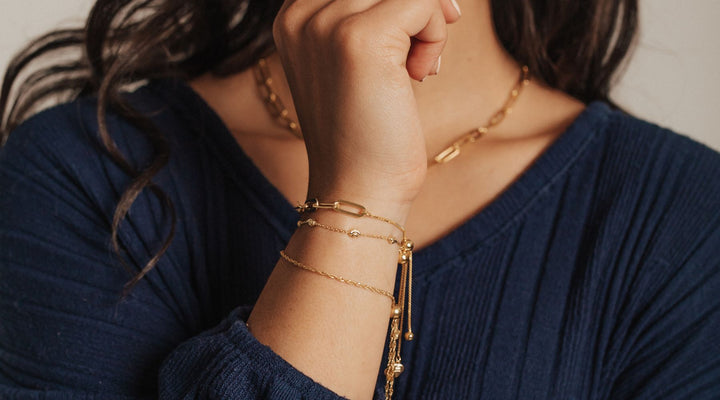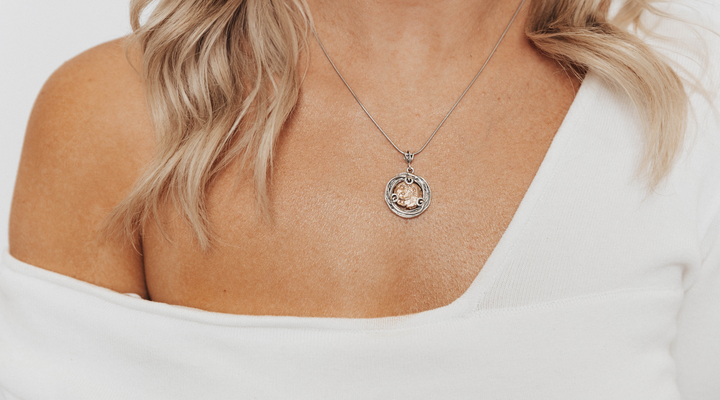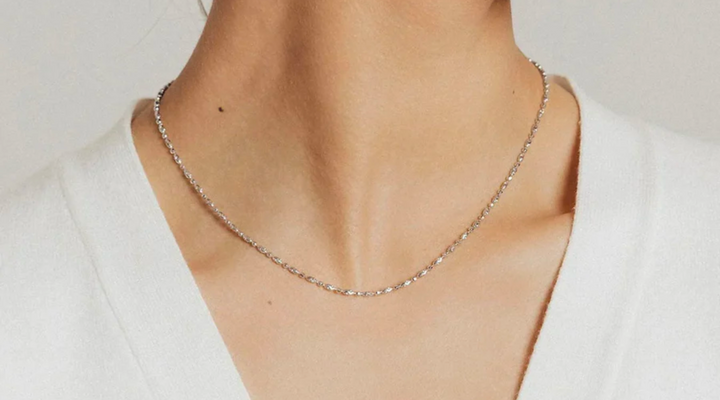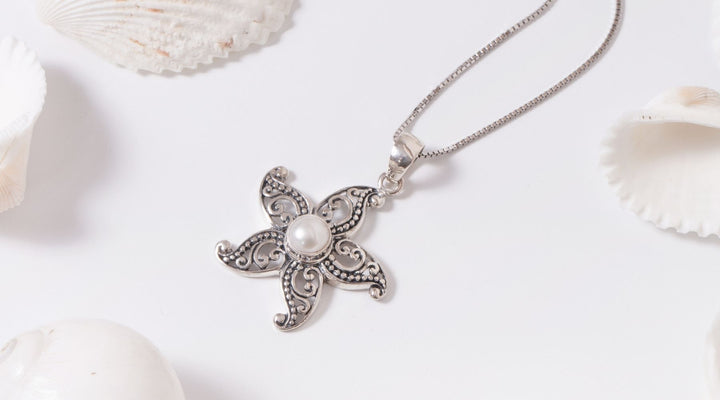Real Gold vs Fake Gold: What You Need to Know
Posted by Deven Davis on

Real Gold vs Fake Gold: What You Need to Know
Did you know that every atom of real gold on earth came from outer space?
Gold forms inside exploding stars and colliding asteroids. The small amounts that made it to earth make it exceedingly rare. Its beauty and rarity combine to make it one of the most valuable elements on earth.
With any item of value, some seek to fool you. When you buy gold, how can you be sure you're getting real gold?
Read on and learn how you can tell if you are getting real gold, and in the purity advertised.
Real Gold vs Fake Gold 101
An item cannot be sold as gold unless contains enough gold to reach a certain purity, determined by its karat rating.
Is it carat or karat? Carat refers to diamonds only. Karat refers to diamonds or gold. For diamonds, it refers to weight. For gold, it determines the ratio of gold content to other metals.
The following types of jewelry look like gold but are not real gold:
- Gold-plated
- Gold-filled (usually with a core of silver)
- Copper or brass is made to look like gold
- Pyrite. A brittle mineral that looks like gold
10 karats is the lowest purity still considered gold.
Gold Purity in Karats
A jeweler or salesman will talk about purity and karats. Not everyone knows what that translates to in valuation.
Use the following real gold guide to understand what karats translate to in purity.
- 24k—99.9%
- 23k—95.83%
- 22k—91.6%
- 20k—83.4%
- 18k—75%
- 15k—62.5%
- 14k—58.33%
- 10k—41.7% (the threshold used for real gold in the USA)
- 9k—37.5%
- 8k—33.3% (the threshold used in some other countries)
The other metals used in gold less than 24 karats are copper, nickel, silver, iron, tin, titanium, or cadmium.
Testing Gold Purity
These tests range from easy to difficult. From cheap to expensive. Never rely on just one of these tests.
Eye Test
24k gold is yellow-orange in color with no variation in lustre. 18k gold is buttery yellow. 14k gold is straw-colored. Gold itself never changes color no matter how old it is.
Hallmark
The manufacturer makes a stamp in the gold indicating the karats and purity of the item. The hallmark also contains the name of the manufacturer and the date of manufacture.
If you see odd purity numbers in the hallmark that do not match the list above, that would be a red flag.
If the hallmark contains one of the following symbols, it is not gold.
- GP—Gold Plated
- GE—Gold Electroplated
- GF—Gold Filled
- GEP—Gold Electroplated (also)
- HGP—Heavy Gold Plated
- HEG—Heave Gold Electroplated
Be aware that older gold jewelry may not have a hallmark. It could still be high-purity gold without one. And remember that a hallmark can easily be faked. Never rely on the hallmark alone as proof.
Touch Test
Hold the gold in your hand to see if the oils in your skin react to other metals in the gold. If the gold does not change the color of your skin, that's a good sign. If it does, it's some other metal (not gold) causing the discoloration.
Many substances that could be on your hands can interfere with this test. Makeup, for example, will turn black when it reacts to other metals in the gold. Since gold of less than 24k is an alloy, it can give you a false negative result.
Scratch Test
Rub the gold on a piece of unglazed ceramic. If it leaves a trail of yellow, it's gold. Any other color you see is from another kind of metal. Remember, you can damage jewelry doing this, so be careful.
Weight Test
You can compare the gold in question to a known, and proven gold piece of a certain purity and size. If the compared piece weighs more or less than the known piece, it's not as pure, or not gold.
If it weighs the same but is larger, that is another clue that it isn't real, or of the same purity.
Magnetic Test
This is one of the first tests you should do. Gold that attracts to a magnet is not gold, or is of sub-par purity.
Plenty of metals are also non-magnetic, making this test inconclusive even if the magnet does not attract to the gold.
Water Test
The weight of gold is 19 times higher than water. It will sink to the bottom of a water-filled container.
Other metals have less density. Many will either float or not sink all the way to the bottom.
Chemical Test
Vinegar reacts to most metals, but not gold. If it reacts to a piece of gold, that is not a good sign.
Nitric acid dissolves most metals, but not gold. Nitric acid test kits are sold for the purpose of testing gold. Be very careful with these. Nitric acid will severely burn your skin, and if it gets in your eyes it can blind you.
Professional Tests
The easy, home tests are never 100% conclusive. If you require a higher degree of certainty, have a professional test done.
Sigma Metalytics Precious Metal Verifier
This test uses electromagnet waves to penetrate the gold and produce a reading. This test will tell you if the metal you selected from a chart is the one actually found in the item.
This test works best for coins and bars of gold. For jewelry, choose either of the following testing methods:
XRF Spectrometer
By shooting x-rays into the metal, this machine excites atoms in the metal. The atoms then return to a normal state. In doing so, the metal emits a small amount of radiation, which the machine reads and matches to known radiation signatures.
Professional Jeweler
A test is only as good as the person performing it. Having someone with experience administering these tests is as good as ... gold.
For a small fee, a professional jeweler has the tools and knowledge needed to determine if your jewelry, coins, or bars, are real gold, and at what purity.
Not All That Glimmers Is Gold
With knowledge of how to tell real gold from fake gold, you can buy gold jewelry with more confidence. It's a wonderful feeling knowing for sure your jewelry is real and will hold its value.
Gold is rare and increasing in value. Now is the time to enhance your gold jewelry wardrobe. Call or visit Roma Custom Designer Jewelry and get the best. We have what you need for all styles and budgets.





